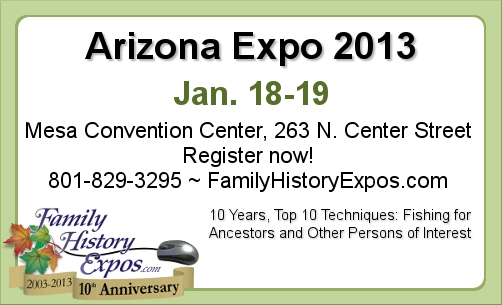Arizona Family History Expo: Let's Talk About Your Book!
Biff Barnes
We’re looking forward to the Arizona Family History Expo which begins Friday in Mesa. One of the things we enjoy is that the participants come ready to learn. Many come equipped with questions they want answered before the expo ends on Saturday. If you have attended a few genealogy conferences you know that the questions people thinking about writing or already working on a family history book will ask usually follow a predictable pattern. Here are five we are sure we’ll here more than once.

- How will I know when my research is done and I can begin writing? A genealogist’s research is never done. You’ll always find things to research about your ancestors. Pulitzer Prize winning historian Barbara Tuchman gave some excellent advice when she said, “The most important thing about research is to know when to stop…One must stop before one is finished; otherwise, one will never stop and never finish.” Starting to develop an outline or write your draft can actually be a good way to see what research you do still need to do.
- What’s the best way to organize my family history book? Most people think that a chronological approach makes the most sense. But the family stories you have to tell may be better suited to organization around topics like military service, entrepreneurship, religious faith, or education which run through the experiences of many family members. Would biographical sketches work better? Might more than one type of organization be combined? In all cases the answer is yes. Part of planning your book is to take inventory of what you know and decide which method best fits the information you have gathered. There is no one size fits all rule for organizing books.
- Do I really need to hire an editor? Harriet Evans, author of the novel Love Always, said recently in a piece in The Guardian, “It’s vital that an author has someone willing to be tough with them.” It’s a lesson I learned when I started writing for the San Mateo Times and was told, “Everybody gets edited.” Over time I learned how much better another pair of eyes and another set of experiences made my writing. How will an editor’s advice pay off? Many different ways, some of which can’t even be foreseen. Evans illustrated the point with a question, “Who knows whether Gone With the Wind would have been as successful had it been called, as it originally was, Pansy, after its eponymous heroine Pansy O’Hara, before Margaret Mitchell’s editor at Macmillan persuaded her to change the name to Scarlett?”
- How much of the work of self-publishing a book can I do myself? That depends, of course, on how skilled you are. Think about this analogy. A few years ago we wanted to add a deck to our house. We’re fairly handy with tools. We read books, researched on the web and drew a set of plans. We purchased several tools we thought we’d need. We sweated through two or three weeks of labor. At the end of the project we had a deck that looked okay for a DIY project. Next time we need something built we’ll hire a professional carpenter and get a professional looking job. Deciding what you can or should do in creating your book is a lot like that.
- Who should publish my book? That seems like a simple, straight forward question. But, as is so often the case, it is not. How big an audience do you anticipate? Print book or ebook? For which e-reader? Hard cover or soft? Color or black and white? Do you want it available on the web? There’s a lot to think about before you decide who will print your book? Different printers or ebook publishers offer different services. When you have answered the questions, you can choose the people you want to publish your book.
One of the things we’re looking forward to at the Expo is talking with people about these and many other questions about creating a family history book. We hope we see you there.